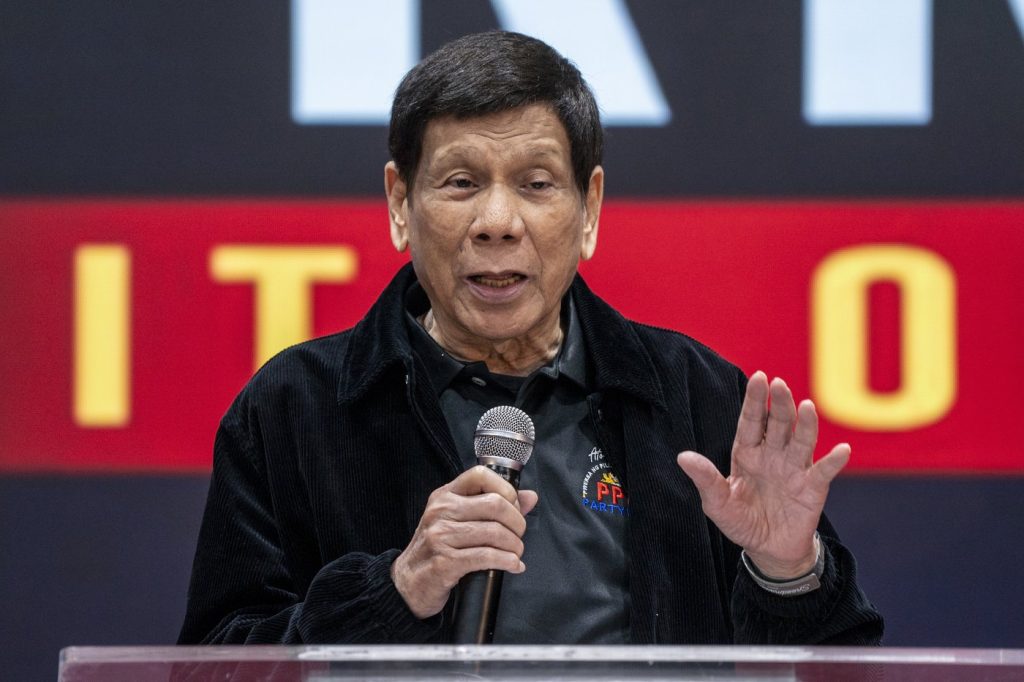Rodrigo Duterte, the former President of the Philippines, has been arrested under a warrant issued by the International Criminal Court (ICC) for crimes against humanity, following a controversial anti-drugs campaign that resulted in thousands of deaths. His detention marks a significant milestone in an international investigation into these killings that spanned over a dozen years. Duterte's violent crackdown on illegal drugs, which he justified throughout his presidency, has left a savage legacy that has drawn both admiration and condemnation.
During a recent trip to Hong Kong, speculation arose about Duterte potentially seeking exile to evade the arrest warrant. Nevertheless, he appeared as the keynote speaker at an event filled with enthusiastic Filipino expatriates. At 79 years old and facing health risks, Duterte continued to campaign for his political party's senatorial candidates ahead of the May 12 elections in the Philippines while acknowledging the ICC warrant for his arrest due to his deadly anti-drug measures.
Duterte's appeal within the Philippines is complex. He gained popularity due to his populist stance, often making expletive-laden comments against elites, the Catholic Church, and foreign powers, particularly the United States. In his hometown of Davao, Duterte became infamous for his brutal methods, with reports suggesting that police and vigilante groups killed around 10,000 drug suspects extrajudicially. His violent rhetoric and approach earned him nicknames like "the Punisher" and "Duterte Harry," akin to a ruthless movie character.
He rose to power by promising to eradicate drugs and corruption in just six months but ultimately left a staggering death toll in his wake. Duterte threatened drug dealers during his campaign, famously telling them, "I will really kill you." His policies drew international condemnation, leading him to rebuff remarks from global leaders, including a well-known confrontation with former U.S. President Barack Obama.
The ICC's inquiry into Duterte began on November 1, 2011, and included incidents of violence up to March 16, 2019. He withdrew the Philippines from the ICC in 2019, an act seen by critics as an attempt to avoid accountability. Despite objections from his administration aimed at halting the investigation, the ICC ruled in July 2023 that the inquiry could proceed. The ICC operates as a court of last resort for serious international crimes, including genocide and crimes against humanity.
Following Duterte's presidency, Ferdinand Marcos Jr. took office in 2022 but has chosen not to rejoin the ICC. Nevertheless, his administration has indicated a willingness to cooperate with the ICC if an arrest request for Duterte is issued via Interpol. Both the Philippines and China, which controls Hong Kong, are not ICC members but are members of Interpol, allowing for potential international law enforcement collaboration.
In a recent speech in Hong Kong, Duterte again asserted the necessity of his anti-drug campaign for maintaining peace in the Philippines. He denied ordering extrajudicial killings, instead portraying his actions as protective measures for the Filipino people. His comments during these appearances indicate he is prepared for incarceration, humorously suggesting donations for the construction of his monument.
Although previously stating he was retiring from politics, Duterte has registered to run for mayor of Davao, alongside his son as vice mayor, in the upcoming May elections. Security measures have been heightened around airports and checkpoints in anticipation of any unrest that his arrest could incite, signaling the administration's readiness to manage potential public turmoil over the situation.










